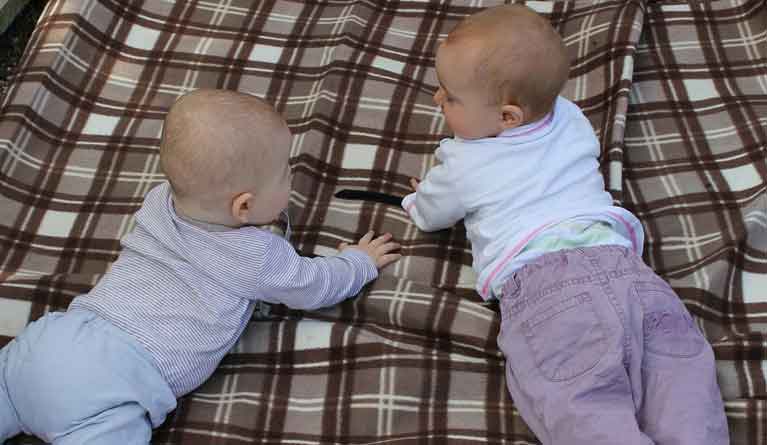It might sound odd, but many people feel shy or weird about talking to their babies. We take a look at how talking and listening to our children can improve their communication skills in leaps and bounds.
Believe it or not, the funny voice all adults use with babies has been given a specific name by researchers – ‘motherese’ or ‘parentese’.
It’s nice to know we’re all not loopy when it comes to talking with babies!
All of us lapse into ‘parentese’ – a deliberate way of speaking with a sing-song tone of voice – when we try to communicate with young children.
We don’t normally even realise we’re doing it. It’s a playful, animated way of speaking that is naturally designed to attract the attention of little ones.
Each word is pronounced slowly and clearly, and the main subject of the verb is repeated frequently to enable learning. And, although words need to be repeated over and over again, parents normally aim for a more innovative and creative way to do this, rather than driving themselves and their babies mad with the same word!
For example: ‘Would you like a drink? OK, I’ll get you one – which drink would you like? Do you prefer to drink orange juice or milk?’
When to start talking to baby
There is no set time when you start talking in Parentese – but you’ll find you automatically start using it as soon as your child is born! Some people find it weird or odd talking to a baby who cannot say a word back, but it’s very important to use language at as early a stage as possible.
If you find it difficult starting off a conversation, use everyday activities as a starting point. Changing their nappy and giving them a bath are two ideal times when you can quietly describe what you’re doing to/with your child.
Children learn language by mimicking and imitating other people so, in time, you will find that those countless conversations did have an effect! With older babies, songs, word games and nursery rhymes are brilliant for engaging their attention, while toddlers will love to sit down with you and a book.
The secret to success is to try to remember to talk to your child as often as you can – on the way to the park, in the supermarket or while preparing dinner.
All language exposure is useful, but children will be much more interested and engaged if it’s a conversation with mummy, daddy or sibling than merely listening to a TV programme.
Remember to listen
Equally important as talking to your child is listening. A gurgling baby might not appear to you as saying very much but they are actually making their own attempt to communicate to you. Instead of ignoring the little sounds coming out of your child’s mouth, encourage her attempts by saying, ‘Yes, I agree,’ or ‘That’s interesting’.
When she’s in her high chair, excitedly saying ‘Googoobagaa!’ ask her if she’d like more food. If she’s pointing or looking at her teddy, ask ‘Would you like your teddy?’. This isn’t so much putting words into the mouths of babes as acknowledging that they, too, have things to tell us.
As well as listening to what your baby is saying, you’ll need to watch their body language for clues. Cues are more obvious with a toddler, because you know your child better and they can make themselves a bit better understood. On the flip side, though, is the fact that toddlers’ needs become more complex than a baby’s. They don’t just eat and sleep and do a bit of playing anymore.
They are busy individuals who want to explore their environment and learn what things do (or what they can make them do!).
Watch for the ways in which your toddler shows you things, such as hunger (pointing to the fridge or going to their high chair perhaps), tiredness (lying on the floor, head on arms) or boredom (increasing amounts of fidgeting, hitting things aside). Once you are able to interpret their cues, your child will feel more comfortable and confident in her own abilities to express herself.
Another good way of learning more about how your child communicates is to listen to him when he’s alone in his room playing or when he’s in his cot, preparing for sleep or waking up. Babies often try out new sounds when they’re on their own, and might relate what they did that day to their bears!
By eavesdropping on his conversation you can see how his language skills are developing.
Never underestimate your baby’s ability
Babies and toddlers are surprisingly quick off the mark. They understand more things than you realise, and pick up words incredibly quickly.
As adults, when we are trying to learn a new thing, we keep trying to think it through and one day it suddenly clicks. Babies are no different so don’t assume that it will be a while before they are able to say, or at least understand, particular words (especially the ‘naughtier’ ones!).
While encouraging your child to communicate by listening to them, you are also showing them how important it is for them to listen to others. Drive home this point by turning off the telly when you want to have a conversation. Don’t attempt a half conversation while ringing one of your friends.
And forget about reading the paper or indulging in other solitary pursuits if you ask your toddler how their day has been. Give them 100 per cent of your time and attention; after all, you’d expect nothing less in return, would you?








Leave A Comment
You must be logged in to post a comment.